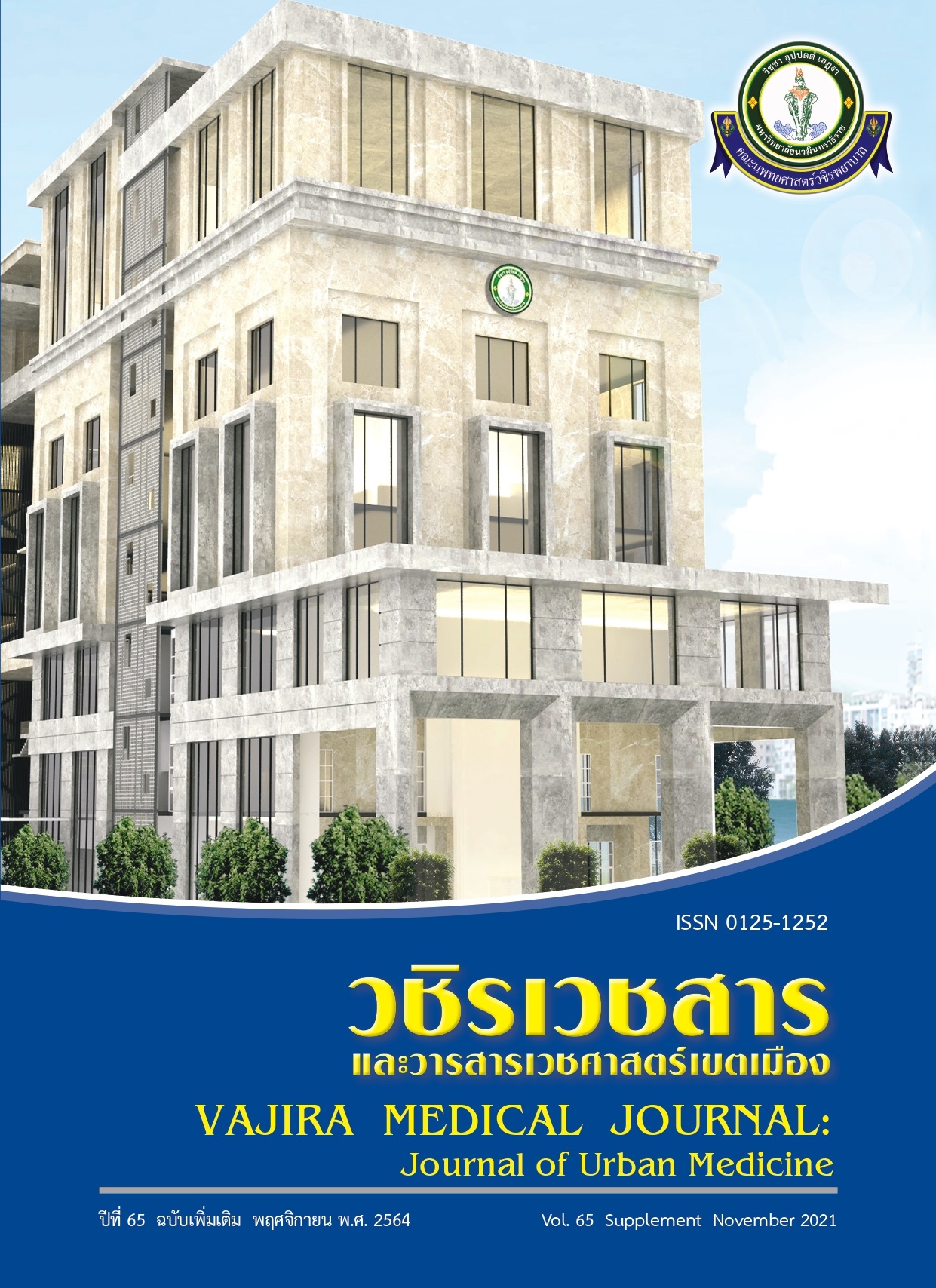Effects of Telehealth Monitoring on Glycemic Control and Medication Adherence in Patients with Poorly Controlled Type 2 Diabetes
Main Article Content
Abstract
Background: Diabetes patients with poor glycemic control have increased risk to develop diabetes-related complications. Patients with diabetes need diabetes self-management education to achieve glycemic target treatment and continue long term care. The use of technology in health education (telehealth) is a convenient and uncomplicated option to monitor the blood sugar level, symptoms of hypoglycemic or hyperglycemic status and the emergence of diabetes. Diabetes patients can easily and quickly access to treatment in a timely manner.
Objective: To evaluate the effects of telehealth monitoring on glycemic control and medication adherence in patients with poorly controlled type 2 diabetes who receive service in Comprehensive NCDs clinic Vajira Hospital.
Method: An experimental study was conducted. A total of 60 subjects were divided into 30 experimental and 30 control groups. All patients receive diabetes self-management education: DSME and followed up for 1 year. The experimental group was followed up by phone using an application line to communicate, educate, evaluate, monitor self-monitoring blood glucose (SMBG) and resolve hypoglycemia or hyperglycemia symptom. The control group was served during the scheduled doctor’s visits. The effect of glycemic control and medication adherence were assessed periodically 3 months and after 12 months of follow-up.
Results: Fasting blood glucose and HbA1C after the 1 year experiment were significantly reduced both in the experimental and control group. There were greater statistically significant reduction in the experimental group than the control group (p-value < 0.001). Comparison of medication adherence before the trial, 96.4% of both groups had low adherence score. At the end of trial, both groups had a statistically significant increase in medication adherence. While the experimental group who received telehealth monitoring was a greater increase in medication adherence than the control group.
Conclusion: Applying telehealth as a tool for continuing diabetes care can facilitate patients to modify health behaviors. This telehealth enhance the ability of self-management and improve clinical outcomes.
Downloads
Article Details

This work is licensed under a Creative Commons Attribution-NonCommercial-NoDerivatives 4.0 International License.
References
Yuen L, Saeedi P, Riaz M, Karuranga S, Divakar H, Levitt N, et al. Projections of the prevalence of hyperglycaemia in pregnancy in 2019 and beyond: Results from the International Diabetes Federation Diabetes Atlas, 9th edition. Diabetes Res Clin Pract 2019;157:107841. doi: 10.1016/j.diabres.2019.107841.
Chatterjee S, Riewpaiboon A, Piyauthakit P, Riewpaiboon W, Boupaijit K, Panpuwong N, et al. Cost of diabetes and its complications in Thailand: a complete picture of economic burden. Health Soc Care Community 2011;19(3):289–98.
American Diabetes Association. Glycemic Targets: Standards of Medical Care in Diabetes-2021. Diabetes Care. 2021;44 Suppl 1:S73-84.
Miller KM, Beck RW, Bergenstal RM, Goland RS, Haller MJ, McGill JB, et al. Evidence of a strong association between frequency of self-monitoring of blood glucose and hemoglobin A1c levels in T1D exchange clinic registry participants. Diabetes care 2013;36(7):2009-14.
Sittipran W, Salubsri S, Kaigate C. Effect of Self-monitoring Blood Glucose Program in Poorly Controlled Type 2 Diabetes Mellitus Patients on Glycosylate Leve. J Prapokklao Hosp Clin Med Educat Center 2558;32:68-82.
Polonsky WH, Henry RR. Poor medication adherence in type 2 diabetes: recognizing the scope of the problem and its key contributors. Patient Prefer Adherence. 2016;10:1299-307.
Krapek K, King K, Warren SS, George KG, Caputo DA, Mihelich K. et al. Medication adherence and associated hemoglobin A1c in type 2 diabetes. Ann Pharmacother 2004;38(9):1357-62.
Wongyai S, Maneesriwongul W, Putawatana P. Factor related to medication adherence among patients with diabetes mellitus type 2 at diabetic clinics. Journal of health and nursing research 2014;30(2):80-90.
Bingham JM, Black M, Anderson EJ, Li Y, Toselli N, Fox S, et al. Impact of telehealth interventions on medication adherence for patients with type 2 diabetes, hypertension, and/or dyslipidemia: a systematic review. Ann Pharmacother 2021;55(5):637-49.
Wong ZS, Siy B, Da Silva Lopes K, Georgiou A. Improving Patients’ Medication Adherence and Outcomes in Nonhospital Settings Through eHealth: Systematic Review of Randomized Controlled Trials. J Med Internet Res 2020;22(8):e17015. doi: 10.2196/17015.
Pro Health Ware. Difference between Telemedicine and Telehealth [internet].2008 [cited 2021 May 24]. Available from: https://allwellhealthcare.com/telemedicine/
Wongprakornkul S. New Era of Healthcare through Business Ecosystem and Telehealth. Mahidol R2R e-Journal 2020;7(2):1-15.
Aberer F, Hochfellner D. A, Mader J K. Application of Telemedicine in Diabetes Care: The Time is Now. Diabetes Ther 2021;12:629-39.
Kotsani K, Antonopoulou V, Kountouri A, Grammatiki M, Rapti E, Karras S, et al. The role of telenursing in the management of Diabetes Type 1: A randomized controlled trial. Int J Nurs Stud 2018;80:29-35.
Borries TM, Dunbar A, Bhukhen A, Rismany J, Kilham J, Feinn R, et al. The impact of telemedicine on patient self-management processes and clinical outcomes for patients with Types I or II Diabetes Mellitus in the United States: A scoping review. Diabetes Metab Syndr 2019; 13(2):1353-7.
Costa V & Pedras S. Partner support, socialcognitive variables and their role in adherence to self-monitoring of blood glucose in type 2 diabetes. European Diabetes Nursing 2012;19(2):81-6.
Nesari M, Zakerimoghadam M, Rajab A, Bassampour S, Faghihzadeh S. Effect of telephone follow‐up on adherence to a diabetes therapeutic regimen. Japan Journal of Nursing Science 2010;7(2):121-8.
Olorunfemi O, Oahimijie FO, Osunde NR, Olabisi OI. Effect of a Telephone and Text Message Follow-Up Program on Medication Adherence among Patients with Diabetes Mellitus: A randomized controlled trial. Journal Nurse and Health Science (IOSR-JNHS) 2019;8(6):14-8.
Conway CM, Kelechi TJ. Digital health for medication adherence in adult diabetes or hypertension: an integrative review. JMIR diabetes 2017;2(2):e20. doi: 10.2196/diabetes.8030.
Yang S, Jiang Q, Li H. The role of telenursing in the management of diabetes: a systematic review and meta‐analysis. Public Health Nursing 2019;36(4):575-86. doi: 10.2196/diabetes.8030.


